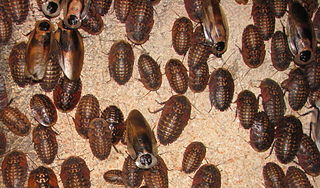
Giant cockroaches, or blaberids, are the second-largest cockroach family by number of species. Mostly distributed in warmer climates worldwide, this family is based on the American genus Blaberus, but much of the diversity is also found in Africa and Asia.

Blattidae is a cockroach family in the order Blattodea containing several of the most common household cockroaches. Notable species include:

Ectobiidae is a family of the order Blattodea (cockroaches). This family contains many of the smaller common household pest cockroaches, among others. They are sometimes called wood cockroaches. A few notable species include:
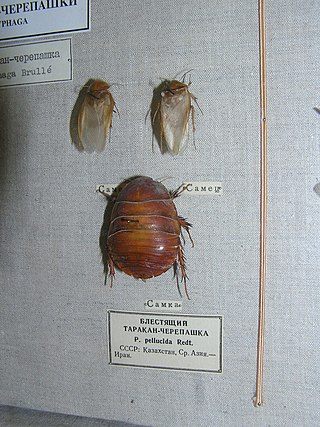
Corydiidae, previously known as Polyphagidae, is a family of the order Blattodea (cockroaches). Many are known as sand cockroaches. The family is divided into five subfamilies, comprising some 40 genera. One prominent species is the desert cockroach, Arenivaga investigata.

The Phaneropterinae, the sickle-bearing bush crickets or leaf katydids, are a subfamily of insects within the family Tettigoniidae. Nearly 2,060 species in 85 genera throughout the world are known. They are also known as false katydids or round-headed katydids.

Ectobius is a genus of non-cosmopolitan cockroaches once thought native to the Old World and described by Stephens in 1835, belonging to the family Ectobiidae, subfamily Ectobiinae. The discovery of 4 ectobius cockroaches in Colorado dating to 49 million years ago suggests the genus actually originated in North America. This genus has been subject to a number of revisions.

Neostylopyga is a genus of cockroaches described by Robert Walter Campbell Shelford in 1911.

Eucorydia is a genus of cockroaches. Species are found in Asia. They are characterized by a metallic greenish-bluish pronotum and sometimes orange markings on the tegmina and/or abdomen.

The Pseudophyllodromiinae are a subfamily of cockroaches, in the family Ectobiidae, with a world-wide distribution.
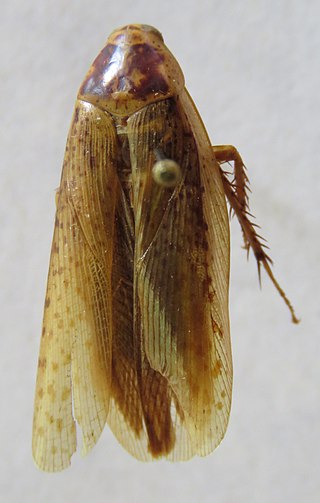
Epilampra is a genus of cockroach in the family Blaberidae. There are more than 70 described species in the genus Epilampra.

Chorisoneura is a genus of cockroach in the family Ectobiidae. There are at least 90 described species in Chorisoneura.

Ischnoptera is a genus of cockroach in the family Ectobiidae.
Salganea is a genus of South East Asian cockroaches in the subfamily Panesthiinae, erected by Carl Stål in 1877.

Rhabdoblatta is a genus of cockroaches in the subfamily Epilamprinae. Species have been recorded from Africa, East, Southeast and South Asia.

Balta is a genus of cockroaches in the sub family Pseudophyllodromiinae. Found in Asia, Africa, Australia and Oceania. The genus was created in 1893 by Johann Tepper.
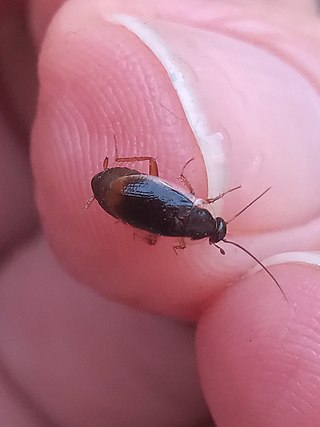
Anaplecta is a genus in the family Anaplectidae. There are at least 20 described species in Anaplecta.
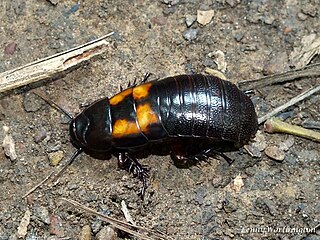
Panesthia is a large genus of burrowing giant cockroach in the subfamily Panesthiinae. It is subsocial and its species are mainly found in Southeast Asia, coastal East Asia, Australasia, and Indo-Malaysia.
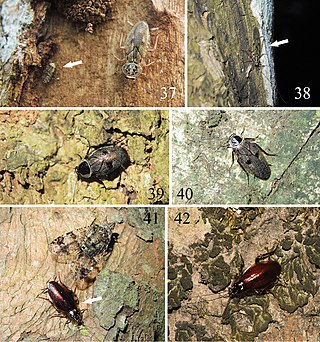
Allacta is a genus of SE Asian and Australian cockroaches in the subfamily Pseudophyllodromiinae.

Corydidarum is a genus of Asian cockroaches in the subfamily Perisphaerinae, erected by Carl Brunner von Wattenwyl in 1865. The recorded distribution is central Africa, India, China, SE Asia through to New Guinea.


















